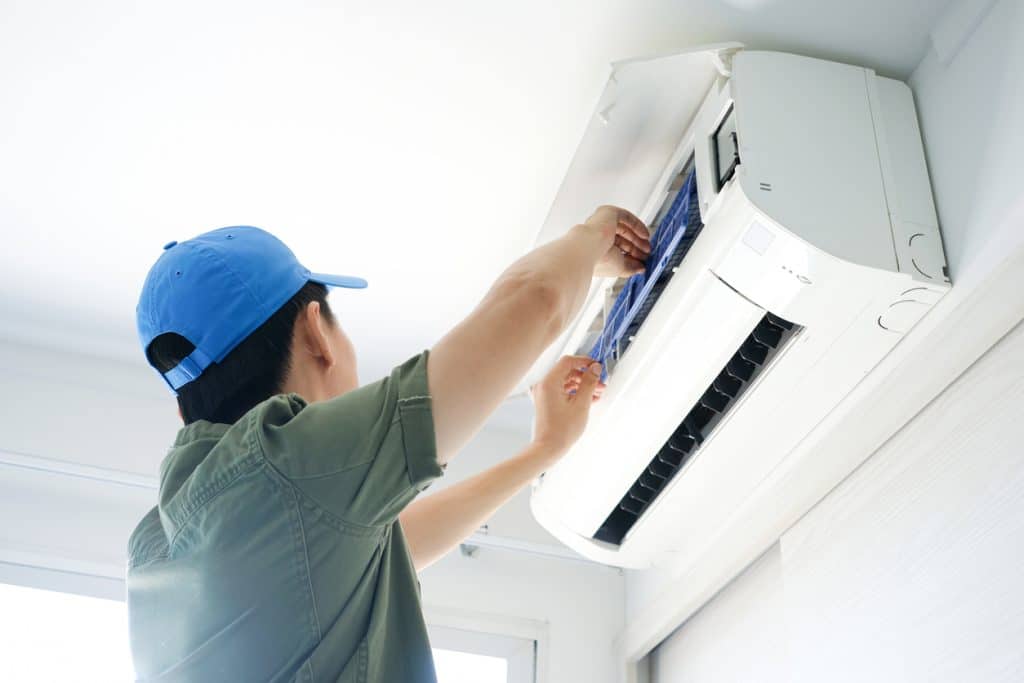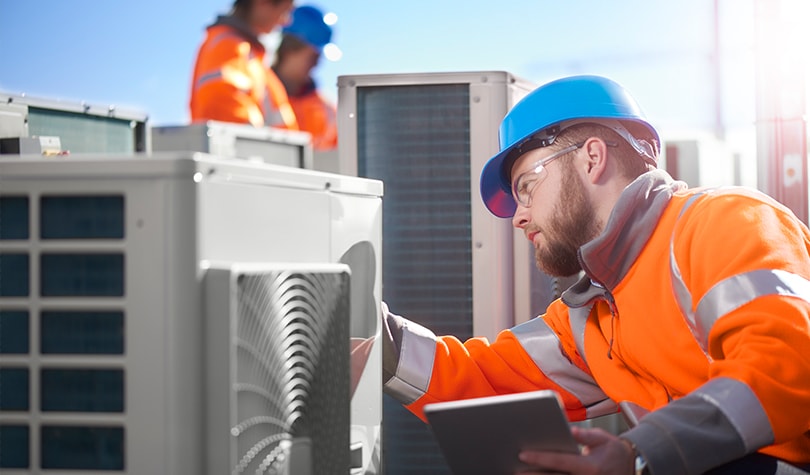The step-by-step process to ac unit replacement for homeowners
Wiki Article
The Value of HVAC Understanding: Uncovering Root Causes Of Air Conditioner Problems for Property Owners
House owners often overlook the value of understanding their heating and cooling systems. Acknowledging usual indicators of cooling troubles can lead to timely treatments. Issues like inadequate cooling or unusual noises are not just nuisances; they can show much deeper problems. By discovering the origin of these issues, house owners can enhance system effectiveness and prolong its life-span. What are one of the most common concerns that can occur, and exactly how can they be successfully resolved?Common Indicators of AC Troubles
How can house owners determine problems with their air conditioning systems prior to they rise? Acknowledging common indicators of air conditioner issues is necessary for timely maintenance. One common sign wants cooling; if the a/c unit falls short to decrease the indoor temperature, it may signal underlying concerns. Unusual noises, such as grinding or hissing, can additionally suggest mechanical failures or loosened elements - ac unit replacement. Furthermore, property owners ought to be cautious of weird odors emanating from the system, which might suggest mold and mildew growth or electric problems. Constant cycling on and off, referred to as brief cycling, can suggest thermostat issues or cooling agent leaks. Furthermore, a rise in energy costs without a corresponding increase in usage might direct to inadequacy. By remaining sharp to these caution indicators, house owners can prevent more substantial concerns and expensive repair work, ensuring their cooling systems operate successfully throughout the warmer months
Comprehending Cooling Agent Issues
Refrigerant issues can greatly influence the performance of an a/c system. House owners must recognize the indications of low cooling agent levels and the relevance of detecting cooling agent leakages. Dealing with these issues quickly can avoid further damages to the system and assurance peak cooling efficiency.Low Refrigerant Degrees
A typical problem that house owners may encounter with their HVAC systems is reduced refrigerant degrees, which can considerably impact the system's performance and efficiency. Refrigerant is important for the cooling process, soaking up warm from indoor air and launching it outside. When levels drop, the air conditioning device has a hard time to cool the area efficiently, causing raised energy intake and prospective system pressure. Signs of reduced refrigerant include insufficient cooling, longer run times, and ice formation on the evaporator coils. Property owners might likewise see uncommon sounds as the compressor functions harder to make up for the shortage. It is essential for house owners to understand the importance of maintaining appropriate cooling agent levels to ensure peak heating and cooling performance and long life.Refrigerant Leaks Detection
Where might a home owner begin when confronted with the possibility of cooling agent leaks in their heating and cooling system? The initial step includes monitoring the system's efficiency. Indicators such as decreased cooling performance, ice development on coils, or hissing sounds may suggest a cooling agent leak. Property owners ought to additionally look for visible indications of oil deposit, frequently an indication of a leakage. Making use of a cooling agent leakage detector can supply even more exact recognition. If suspicions persist, seeking advice from a qualified heating and cooling service technician is essential, as they have the knowledge and devices to find leaks successfully. Motivate discovery and fixing of refrigerant leakages not just improve system efficiency however additionally prevent potential ecological injury, making it an important element of a/c upkeep.Electrical Failures and Their Impact
Electric failures can considerably affect HVAC systems, especially through issues like breaker breakdowns and defective circuitry. These troubles not only interrupt the system's efficiency however can additionally cause costly repair services and safety threats. Understanding the ramifications of such failures is vital for homeowners to keep a reliable and safe a/c atmosphere.Breaker Issues
Just how can circuit breaker problems affect the effectiveness of a heating and cooling system? Circuit breakers work as essential safety and security gadgets that take care of electrical circulation to a/c devices. If a breaker trips often, it interrupts power supply, resulting in inconsistent home heating or air conditioning. This can create considerable strain on the system, leading to inefficient procedure and potential damages to elements. Home owners may discover boosted energy bills because of the a/c system's battle to keep wanted temperature levels. Additionally, repeated disruptions from tripped breakers can reduce the life expectancy of the air conditioner unit, requiring expensive repair work or replacements. Normal upkeep of circuit breakers is critical, as it assures a steady power supply, ultimately improving the general effectiveness of the heating and cooling system.Faulty Wiring Impact
Often forgotten, damaged wiring can have dire repercussions for cooling and heating systems. Wiring concerns might cause short circuits, leading to regular breakdowns and boosted repair service expenses. Furthermore, improper circuitry can create inefficient power use, leading to greater energy costs and pressure on the system. In serious cases, malfunctioning wiring can cause electrical fires, presenting a substantial safety risk to homeowners. Furthermore, these electrical failures can damage cooling and heating parts, resulting in expensive substitutes or considerable fixings. Home owners ought to prioritize normal inspections by qualified experts to recognize and correct circuitry issues before they intensify. Comprehending the implications of damaged circuitry can help assure the longevity and security of a/c systems, inevitably protecting both the home and its owners.Clogged Filters and Their Consequences
While several property owners may neglect the significance of normal filter maintenance, stopped up filters can bring about substantial repercussions for cooling and heating systems. When filters end up being blocked with dust, dust, and debris, air movement is limited. This decrease in air flow compels the system to work harder, causing increased energy usage and possibly greater utility expenses. In time, this pressure can cause wear and tear on elements, resulting in early system failing.In addition, stopped up filters can compromise interior air high quality. Toxins and irritants might flow linked here throughout the home, intensifying respiratory concerns and allergies for occupants. Insufficient air flow can trigger the evaporator coil to freeze, leading to costly repair work and inefficient air conditioning performance. On a regular basis transforming or cleaning filters is an easy yet vital upkeep task that can assist assure the longevity and performance of HVAC systems, ultimately benefiting both the homeowner's convenience and their financial resources.

Thermostat Malfunctions Clarified
What happens when a thermostat malfunctions can considerably affect both convenience and power effectiveness in a home (ac unit replacement). A damaged thermostat may fall short to accurately review the temperature level, resulting in overcooling or not enough cooling. This inconsistency can trigger discomfort for occupants and result in higher energy costs, as the cooling and heating system functions harder than requiredUsual issues consist of dead batteries, which can make electronic thermostats defective, and loosened electrical wiring that interrupts interaction between the thermostat and the HVAC device. Additionally, obsolete or poorly calibrated thermostats might not react properly to temperature adjustments, additionally intensifying energy inadequacy.
House owners must be vigilant for indicators of malfunction, such as inconsistent temperatures or unforeseen energy expenses. Routine checks and understanding of the thermostat's capability can aid determine issues early, making certain peak efficiency of the cooling and heating system. Addressing thermostat issues immediately is crucial for keeping a comfy living environment and managing energy usage efficiently.
The Function of Regular Maintenance
Regular upkeep plays an essential role in making sure the durability and effectiveness of HVAC systems. Homeowners who focus on routine checks can prevent small concerns from rising right into pricey repair work. Normal upkeep typically consists of jobs such as cleansing filters, inspecting ductwork, and inspecting refrigerant degrees. These tasks help preserve suitable airflow and system efficiency, lowering energy intake.Moreover, a well-maintained a/c system runs more efficiently, offering consistent convenience throughout the home. Routine tune-ups can also prolong the life expectancy of the unit, bring about considerable cost savings with time. House owners are encouraged to set up professional assessments at least annually to identify potential problems early.
Additionally, many producers require regular upkeep to maintain guarantees, making this method not just beneficial but often essential. In general, comprehending the value of routine upkeep empowers homeowners to secure you could try this out their HVAC systems versus unforeseen failings and improve their investment in home comfort.
Regularly Asked Inquiries
How Can I Boost My A/c's Power Efficiency?
Improving an air conditioner's energy performance entails routine maintenance, cleansing or replacing filters, securing ductwork, guaranteeing appropriate insulation, using programmable thermostats, and scheduling professional examinations to determine and remedy potential problems affecting performance.
What Is the Life expectancy of a Typical A/c Unit?
A typical air conditioning unit has a life-span of 15 to twenty years, depending on upkeep, use, and ecological elements. Regular upkeep can significantly prolong its functional life and enhance overall performance.
When Should I Change My Cooling System?
An a/c system ought you can find out more to generally be changed every 10 to 15 years. Signs for substitute consist of regular repairs, rising energy expenses, and insufficient air conditioning, indicating that an upgrade may be more economical and efficient.Can I Troubleshoot A/c Issues Myself?
Yes, individuals can repair a/c problems themselves by checking filters, ensuring power supply, and checking for visible problems (HVAC company). Nevertheless, complicated problems frequently need specialist support for exact diagnosis and safe repair service, guaranteeing perfect system efficiency
Just how Do I Select a Reliable HVAC Professional?

To pick a reputable cooling and heating service technician, one must seek referrals, examine on-line evaluations, validate licenses and insurance, analyze experience, and request thorough price quotes to guarantee high quality service and reasonable pricing prior to making a decision.
Verdict
To sum up, a solid understanding of cooling and heating systems enables property owners to successfully detect and address typical air conditioning concerns. Identifying indicators such as poor cooling or increasing energy expenses permits timely interventions, which can considerably improve system efficiency and durability. By staying informed about potential issues like refrigerant leaks, electric failings, and clogged filters, homeowners can take proactive measures to keep their systems, inevitably making sure convenience and promoting a much healthier living atmosphere. Routine maintenance stays essential to this endeavor.Report this wiki page